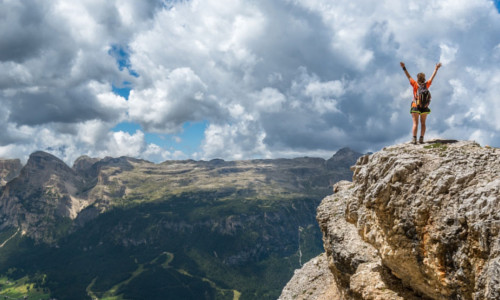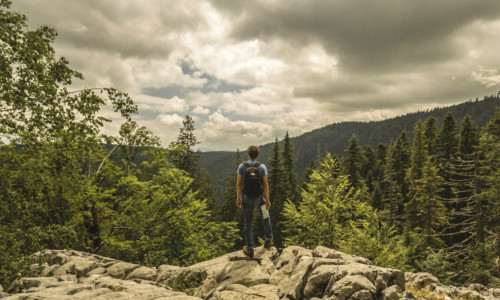Know Yourself Better With a Solo Hike
Author

A keen runner, skier and nuts about cycling. Karl lives in Cumbria, where he loves encouraging his two children to follow in his outdoor lifestyle. Whilst out and about keeping active, Karl keeps a diary and shares it with Outdoor Look.
 For many years, I contemplated going out for a solo hike. But the thought of facing the wilderness all alone did not seem all that appetizing in the beginning. A number of times I planned a solo hike and every time my plans came crashing down due to a lack of self-belief.
For many years, I contemplated going out for a solo hike. But the thought of facing the wilderness all alone did not seem all that appetizing in the beginning. A number of times I planned a solo hike and every time my plans came crashing down due to a lack of self-belief.
Last month, finally, I decided to take the plunge and set out for a hike without my trusted companions. I started my voyage with a stomach full of butterflies, hoping that my years of experience would be enough to see me through. The events that transpired were humbling to say the least, but that is a story for another time. With the success of my first hike, I hit the trail again the following weekend, and felt more at ease with myself. With the solo hikes, I got to know myself better and gained a lot of confidence. I encourage you to follow in my footsteps with a few tips to make your first experience successful.
1. Be Well Prepared
Being well prepared is quite a broad term. One can be fully prepared for an adventure in terms of their knowledge, but any gaps in your knowledge can cause major problems down the road. As you cannot fully fathom the external factors, you should try to figure out a way to manage your own personal preferences. In case you find it difficult to navigate through a trail on your own, keep a compass and a GPS system handy. It is not a bad idea to have a printed out map in the backpack, in case you lose internet connectivity. People who generally rely on others for setting up a camp should practice tent construction at home, preferably under supervision.
2. Breakthrough the Boredom with Books
Wildlife and inclement weather are not your only adversaries during a solo travel. The biggest foe during a solo hike is boredom. You are sure to find a lot of time on your hands whenever you camp. Instead of letting the boredom defeat you; beat it by devoting your free time to reading. Take advantage of all that freedom and finish off all your reading material in the tranquil surroundings.
3. Share your Itinerary with Loved Ones
You should always be prepared for the worst on your solo travel. Sharing your itinerary with the loved ones will let them track you in case you do not reach your destination in time.
 4. Get Interactive With Locals
4. Get Interactive With Locals
Man is a social animal and lack of company throughout the hike does not go too well with his nature. Interacting with locals provide you with an interesting way to learn about their culture and break through the monotony of a hike. You also learn about new places to visit by communicating with the local population. I learned about a wonderful waterfall during my last solo hike. When I brought my friends to that location on my next group hike, they were greatly moved by its beauty and thanked me for bringing them there.
5. Memorize Key Locations
It is hard to remember the whole route during a hike. Instead of memorizing all the directions, focus on key locations and cram them in your brain. You cannot always predict what will happen on your travel to an unknown place. By keeping the information of important places in your mind, you will never lose your way. Navigating through areas without looking at a map will make you appear confident and more like a local than a tourist. This will keep shady characters at bay who otherwise may try to swindle or deceive you.
Author

A keen runner, skier and nuts about cycling. Karl lives in Cumbria, where he loves encouraging his two children to follow in his outdoor lifestyle. Whilst out and about keeping active, Karl keeps a diary and shares it with Outdoor Look.
Categories
- Sport (28)
- Product Reviews (3)
- Team Outdoor Look (7)
- Mike Wild (2)
- Mike Payton (2)
- Suse Hammond-Pears (3)
- Snowboarding (12)
- Latest Offers (105)
- Shop Talk (1)
- Competitions (7)
- Walking (413)
- Lifestyle Fashion (8)
- Travel (86)
- Kit Guides (176)
- Workwear Clothing (6)
- Safety Workwear (4)
- Health/Fitness (289)
- Skiing (91)
- Great Outdoors (1316)
- Cycling (92)
- January 2025
- December 2024
- November 2024
- October 2024
- September 2024
- August 2024
- July 2024
- June 2024
- May 2024
- April 2024
- March 2024
- February 2024
- January 2024
- December 2023
- November 2023
- October 2023
- September 2023
- August 2023
- July 2023
- June 2023
- May 2023
- April 2023
- March 2023
- February 2023
- January 2023
- December 2022
- November 2022
- October 2022
- September 2022
- August 2022
- July 2022
- June 2022
- May 2022
- April 2022
- March 2022
- February 2022
- January 2022
- December 2021
- November 2021
- October 2021
- September 2021
- August 2021
- July 2021
- June 2021
- May 2021
- April 2021
- March 2021
- February 2021
- January 2021
- December 2020
- November 2020
- October 2020
- September 2020
- August 2020
- July 2020
- June 2020
- May 2020
- April 2020
- March 2020
- February 2020
- January 2020
- December 2019
- November 2019
- October 2019
- September 2019
- August 2019
- July 2019
- June 2019
- May 2019
- April 2019
- March 2019
- February 2019
- January 2019
- December 2018
- November 2018
- October 2018
- September 2018
- August 2018
- July 2018
- June 2018
- May 2018
- April 2018
- March 2018
- February 2018
- January 2018
- December 2017
- November 2017
- October 2017
- September 2017
- August 2017
- July 2017
- June 2017
- May 2017
- April 2017
- March 2017
- February 2017
- January 2017
- December 2016
- November 2016
- October 2016
- September 2016
- August 2016
- July 2016
- June 2016
- May 2016
- April 2016
- March 2016
- February 2016
- January 2016
- December 2015
- November 2015
- October 2015
- September 2015
- August 2015
- July 2015
- June 2015
- May 2015
- April 2015
- March 2015
- February 2015
- January 2015
- December 2014
- November 2014
- October 2014
- September 2014
- August 2014
- July 2014
- June 2014
- May 2014
- April 2014
- March 2014
- February 2014
- January 2014
- December 2013
- November 2013
- October 2013
- September 2013
- August 2013
- July 2013
- June 2013
- May 2013
- April 2013
- March 2013
- February 2013
- January 2013
- December 2012
- November 2012
- October 2012
- September 2012
- August 2012
- July 2012
- June 2012
- May 2012
- April 2012
- March 2012
- February 2012
- January 2012
- December 2011
- November 2011
- October 2011
- September 2011
- August 2011
- May 2010
- April 2010
- March 2010
- February 2010
- January 2010
- November 2009
- October 2009
- September 2009
Submit a Comment